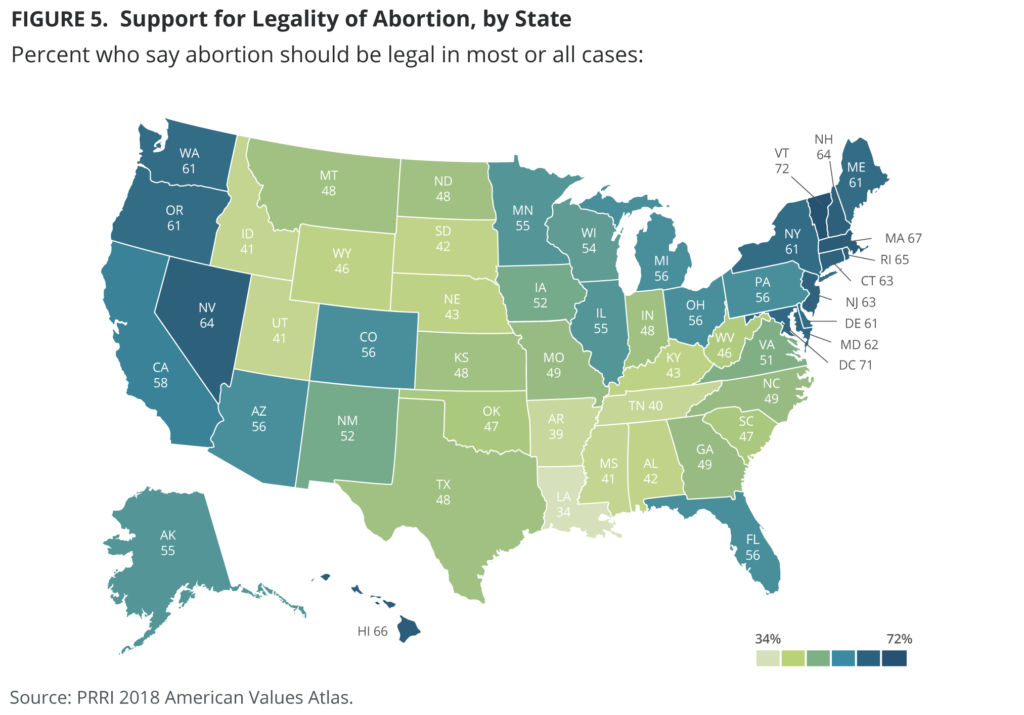To access PDF crosstabs from PRRI’s March 2022 abortion survey, please click here for demographic breaks and here for religion breaks.
With a leak from the U.S. Supreme Court indicating that Roe v. Wade, the 1973 decision that affirmed a constitutional right to abortion, will be overturned in the coming weeks, new data from PRRI shows that the court’s decision will be far removed from what most Americans want. As of March 2022, a broad majority of Americans oppose overturning Roe v. Wade (61%) and just over one-third (36%) support it. Opposition is highest among Democrats (74%), including a majority (56%) who strongly oppose overturning Roe. Most independents (61%) also oppose a Roe overturn.
Even Republicans are divided on overturning the landmark decision–48% oppose overturning Roe v. Wade, and 52% support it. Similarly, white evangelical Protestants, the group most likely to support overturning Roe v. Wade, are divided, with 46% opposed to overturning it and 52% in favor. More than six in ten of all other religious groups oppose overturning the landmark decision that made abortion available nationwide.
Additionally, nearly half (48%) of all Americans are unsure whether abortion will remain legal or become illegal in their state. There are only small differences by party – Republicans (48%) and independents (50%) are slightly more likely to say they aren’t sure what will happen than Democrats (44%). By ideology, moderates (56%) are significantly more likely to say they are not sure than conservatives (47%). Both moderates and conservatives are more likely to not know than liberals (40%).
Across religious groups, there are only minimal differences in knowing what will happen if Roe v. Wade is overturned. Those living in the Midwest Census region (55%) are more likely to not know what will happen in their state than those living in the Northeast (49%), West (47%), or South (45%). Women (52%) are more likely than men (44%) to say they don’t know what will happen.
Most Americans Support Abortion Legality
Nearly two-thirds of Americans say abortion should be legal in most or all cases (64%), including majorities of Democrats (87%) and independents (66%), compared to 36% of Republicans. Among Christians, white evangelical Protestants remain the substantial outliers with 30% saying abortion should be legal in most or all cases, compared to 73% among Black Protestants, 70% among white mainline (non-evangelical) Protestants, 59% among white Catholics, 57% among Hispanic Catholics, and even 52% among Hispanic Protestants. Among those who follow non-Christian religions, 80% say abortion should be legal in most or all cases, while 85% of those who are religiously unaffiliated agree. Only a modest gender gap exists–more than six in ten men (61%) and women (66%) say abortion should be legal in most or all cases.
PRRI has previously surveyed all 50 states in the 2018 American Values Atlas. The state-by-state results reveal that across the country, majorities of Americans in most states support abortion legality in most or all cases. In no state does more than one in four Americans say abortion should be illegal in all cases.
Methodology for 2022 Survey:
The survey was designed and conducted by PRRI. The survey was conducted among a representative sample of 5,042 adults (age 18 and up) living in all 50 states in the United States who are part of Ipsos’s Knowledge Panel, and an additional 419 who were recruited by Ipsos using opt-in survey panels to increase the sample sizes in smaller states. Interviews were conducted online between March 11 and 30, 2022.
The margin of error for the national survey is +/- 1.6 percentage points at the 95% level of confidence, including the design effect for the survey of 1.4. In addition to sampling error, surveys may also be subject to error or bias due to question wording, context, and order effects. Additional details about the KnowledgePanel can be found on the Ipsos website: https://www.ipsos.com/en-us/solution/knowledgepanel
Methodology for 2018 Survey:
Results are based on a subset of 40,292 telephone interviews (including 24,149 cell phone interviews) conducted between March 14, 2018 and December 16, 2018 by professional interviewers under the direction of SSRS. The margin of error for issue subsample is +/- 0.5 percentage points at the 95% level of confidence. The design effect for the total sample, the issue subsample, and the same-sex marriage question subsample is 1.4. In addition to sampling error, surveys may also be subject to error or bias due to question wording, context, and order effects.





